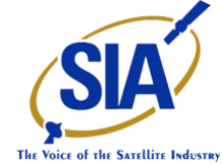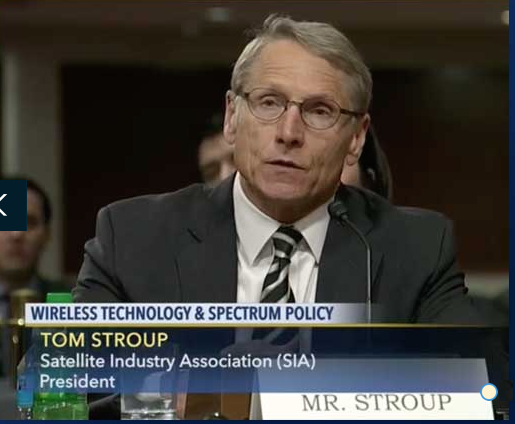

CNN footage from a July 10, 2018 testimony before
the Senate subcommittee.
Mr. Stroup’s testimony focused on the current and future value of satellite broadband and the importance for policymakers to create a cooperative spectrum environment for both the satellite broadband community and terrestrial wireless stakeholders. Such an environment would foster spectrum efficiency, U.S. technical innovation for next-generation connectivity and help ensure long-term American leadership in 5G.
“Today, I would like to discuss the benefits, innovations, and related spectrum policies for enabling satellite broadband as part of the race for 5G and next generation services under U.S. global spectrum leadership,” said Tom Stroup in his oral testimony. “The satellite industry has invested tens of billions of dollars to innovate and increase connectivity in the United States and across the globe. Today, users across the U.S. receive 25/3 Mbps speeds meeting the FCC’s definition of broadband service, and this year the industry reached a new milestone, providing up to 100 Mbps download speeds.
“With satellites that are under construction today, operators will have the ability to reach speeds of up to a gigabit per second and simultaneously process a terabit of data per second. These high throughput geostationary satellites will provide orders of magnitude capacity increases — remaining competitive with terrestrial offerings. At the same time tens of thousands of new non-geostationary satellites from multiple providers will soon be launching into Low-Earth and Medium-Earth orbits to provide low-latency, high-speed broadband across the globe.”
Regarding the importance of spectrum management, Mr. Stroup added, “Of course, all of the breakthroughs we’ve seen because of satellite broadband technologies should not be taken for granted. Satellite innovations depend on our industry’s ability to reliably access spectrum. U.S. policymakers have within their reach an opportunity to ensure the U.S. leadership in the 5G ecosystem and to include satellite broadband operators and terrestrial wireless stakeholders. For spectrum policy to work for satellites, because of their global reach, we also need leadership at home and abroad. The FCC must continue to ensure satellite and 5G can advance their spectrum needs by providing leadership at the upcoming World Radio Conference, one that recognizes the global dimension of satellite spectrum requirements.”
A written copy of SIA’s complete testimony is available at the following link:


